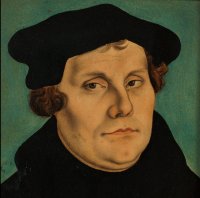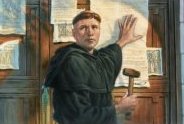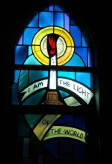The Birth of LUTHERANISM
As St. Peter’s Lutheran Church in Brunsville celebrates 100 years, the whole Lutheran Church celebrates it's 500 years of preaching the truth of God’s Word. Besides teaching God’s promise of saving grace through faith, church communities have provided heartwarming, true fellowship for its members & the surrounding neighbors.
The Reformation -1517
Politics, power & money played equally as much a part in the Reformation as that of religious renewal that Martin Luther preached for the salvation of man kind’s soul.
- The birth of the Protestant Church, the Reformation, is considered to begin on October 31, 1517. There was much unrest, both political & religious, in all of the northern part of the Roman Empire, in the German lands, at that time. A new Emperor for the whole of the Roman Empire was about to be voted in and Luther unwittingly played into this instability
- On this 31st day in October, Dr. Martin Luther hung 95 Theses on the Wittenberg Castle Church doors in the university town of Wittenberg, Germany.
- Dr. Martin Luther was now a professor of theology at the University of Wittenberg. Luther came to the University as a monk and a priest from the Augustinian Order in Erfurt, Germany.
- Luther had entered the Augustinian Monastery in 1505 to become a monk. He sought here behind these closed doors,‘to save his soul’. At the time Luther entered the monastery he doubted his own salvation and feared judgment of an ‘angry God’. Luther found no true peace for his soul there!

- He did not know the God of MECRY, but the judging God he desperately feared. He, and all the folk in the land.
- The heavy wooden doors of the church were like a bulletin board for the professors.
- Luther wanted to debate what he saw as wrong practices within the Roman Catholic Church. Such announcements were very common. Sometime in September, about 6 weeks earlier, Luther hung 97 Theses on the doors. Nothing much is heard of those 97!
- One major deeply troubling practice of the church was the selling ‘forgiveness of sins’ or absolution or ‘INDULGENCES’, as they were then called.
- Theses’ is a word meaning discussion points. They were intended for a religious debate within the university or the church environment with fellow professors & church leaders.
- These 95 Theses were written in Latin. It is estimated only 1-2% of all the population at that time could read Latin. It was the language of the university & the church: the learned.
- These ‘Theses’ are not written with protest but as dispute considerations. Luther was astonished that they had been taken down. They were translated into German and printed out on Gutenberg’s printing press. The printing press was not new, but the interchangeable type. Luther’s 'Theses' challenged the dogmas of the Holy Roman Catholic church, to be exact: the authority of the Pope, the authority of the Scripture as unwavering, final Word of God.
- Luther’s fury was growing as he saw the common folk being fooled by the indulgence sellers. In the Scripture Luther did not find any reference to indulgences!
- On setting out, Luther had no intention with a split with the Roman Catholic Church, nor for that matter, any other ruckus, war, killings & death.
- Luther had now been reading the ‘BIBLE’. This was an all too strange thing to be doing in those years. One problem was that there were no Bibles to be had, and then, another, if you even had been schooled to read.
- Duke Frederick, also known as Frederick the Wise, forbid the selling of these indulgences in his state. But his parishioners went to the neighboring states to purchase these. This angered Luther.
- Luther, with the selling of indulgences in the neighboring states, believed that here the Roman Catholic Church has lost its footage in Christianity.
- Perhaps the most famous of the sellers of indulgence, a member of the concurrence to the Augustine Order, that of the Dominican Order, the prior and inquisitor, was John Tetzel.
- Tetzel traveled about as town crier in the market places. He brought this ‘Forgiveness’ promise and document signed by Pope Leo Xth in Rome along with him. Tetzel promised that with true repentance and with the purchases of these indulgences, your own soul or still better, even that of your loved ones would be freed from time in purgatory. [That only of course, is if you spent your money to purchase an indulgence for him or her, that one too would be freed from purgatory.]
- This is Tetzel’s so very famous selling jingle, along with drums & trumpets, for the collection box:
As soon as the coin in the coffer rings,
The soul from purgatory springs.
• With such, Luther more, troubled, & angry, realized that the common folk would believe that the freedom of your soul, your entrance to heaven, could be purchased.
- That was certainly not to be found in the ‘Scripture’ Luther was studying.
[(that)The Pope in Rome has the authority to sell forgiveness!]
- Now, The Reformation was off to a fast moving pace and it could no longer be stopped.
- Luther’s ’95 Theses’ were the major catalyst that ignited displeased Princes & Dukes, farmers & professors.
- The challenges ahead multiplied before the Lutheran Church solidifies.
- Luther became known for his faith in God, in the God of the Holy Scriptures,in the truth of the Bible.
- Luther preached that man is saved by grace that is alone in Jesus Christ, alone the Lord God of the Holy Bible, alone faith.

All information above can be found on various web sites throughout the internet including luther.de/en/95thesen
The Evangelical Lutheran Church of America
celebrates the 500th anniversary of the Reformation.

